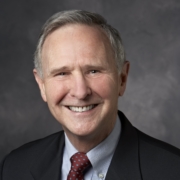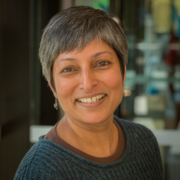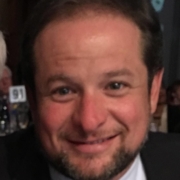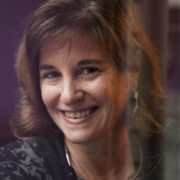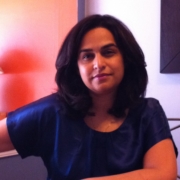Pasi Sahlberg
CIES Symposium Day 2: Wrap up
This is the final show in the global learning metrics mini-series. The two day inaugural CIES symposium has concluded. As a wrap up, I’m going to play my brief conversation with Pasi Sahlberg, a professor at the University of Helsinki, about some of his reactions to the symposium. He tweets at @pasi_sahlberg. I hope you’ve enjoyed this mini-series!
Citation: Sahlberg, Pasi, interview with Will Brehm, FreshEd, podcast audio, November 12, 2016. https://freshedpodcast.com/pasisahlberg/
Pasi Sahlberg 0:27
My name is Pasi Sahlberg and I live in Helsinki. At the moment, I’m a sabbatical writer. So, I’m writing.
Will Brehm 0:34
So, a lot of op-eds?
Pasi Sahlberg 0:37
Yeah, op-eds. And I have a couple of books underway.
Will Brehm 0:40
Must be nice.
Pasi Sahlberg 0:40
I just need time to stop and think for a moment.
Will Brehm 0:44
Yeah, exactly. So, how is the symposium going so far, do you think?
Pasi Sahlberg 0:50
The symposium is interesting. You know, I really enjoy this rather small community. You can easily get to know everybody you can. You can reach all the speakers and it’s very informal. So, it’s going well.
Will Brehm 1:04
And any ideas that have stuck out in your opinion?
Pasi Sahlberg 1:10
There’s been a lot of talk about these international assessments and studies, and I think it probably is because of the way people come to these events. But I can hear a growing concern about some of these things that we’ve been doing through these studies like PISA, TIMMS, or PIRLS. I hope that there is beginning to be a kind of a wider recognition among this community and others about the limitations of these studies but also possibilities. I think the black and white thinking is not necessarily what we need. I think we need a better understanding of this. This symposium has helped me also to understand a little deeper about the true nature of these large-scale international assessments.
Will Brehm 2:03
So, to see some of the gray area.
Pasi Sahlberg 2:05
Yeah, exactly. And I think that earlier, probably five years ago, when there were people who were raising questions and concerns about the reliability and trustworthiness of the studies, they were seen like, “So, you just want to be critical and criticize everything”. But I think that in this community, for example, here, I think, it’s becoming more really like a discourse. That we can have a conversation about these gray areas. And as I said, try to understand better what we’re doing.
Will Brehm 2:34
So, how would you define global learning metrics?
Pasi Sahlberg 2:40
You know, I must admit that before this symposium, I didn’t really use this term too much. And that’s why for all the way until now, when I came here, I think that global learning metrics have really meant to me primarily these available student assessments like we have been discussing -TIMMS, PIRLS, ICCS, PISA, and the others. It’s kind of a way, how we use standardized ways of measuring parts of school education around the world. So, that’s what my mind tells me the global learning metrics are.
Will Brehm 3:22
I was the same way. When I heard the topic, I said, What are global learning metrics? And I actually thought it might sound rather boring, you know. But then listening, I heard a lot about PISA. And then the other parts that I heard a lot about were the Sustainable Development Goals. You know, like, it was another sort of -and there is almost like a tension. It’s like, you can’t equate PISA with global learning metrics because the Sustainable Development Goals, it’s about trying to identify and come up with one that could then be used.
Pasi Sahlberg 3:56
Yeah. But then I think also, we should probably include in this, the conversation about these metrics is all these global skills and competencies discourse that is also evolving and very much driven by the international development organizations like the World Bank, OECD, and others. And I think those also are related to these measurement things that we are talking about. These kind of global standards for schools that are often much more about skills than anything else.
Will Brehm 4:29
Right. And do you think it’s actually possible to measure these skills, 21st century skills, for instance?
Pasi Sahlberg 4:37
Well, you know, I belong to those who – I don’t quite understand this whole conversation about 21st century skills. I was a teacher in the 1980s and most of those things were essential parts of teachers’ work already 35 years ago. And many of them come from the past. So, I would rather not talk about 21st century skills. But I think it’s a good question to ask whether can we measure, for example, social skills or creativity. And I know that there are many people who are trying to develop again kind of a metrics for measuring tolerance or creativity or those things. I think it’s going to be extremely difficult to have a globally reliable measure of something like creativity for example, because I think that if you have kind of a standard how to do that, you by definition, will narrow down the very complex and open meaning of creativity, for example. What do you mean? And then, of course, the danger is that as soon as we have a common definition for what creativity is and how its measured, then the schools are beginning to do those things, and leave all the other parts of the creativity, for example, away. And I think that may be kind of a thing that we should not be doing.
Will Brehm 6:03
Right. I mean, something like creativity seems like it would evolve. And it can be understood differently by different people and is enacted differently. And it just doesn’t seem like it would even be possible to come up with a proxy.
Pasi Sahlberg 6:20
Exactly, yes. And I would rather see something very different to be done in this field. For example, why couldn’t we have a system where, let’s say, within the 34 OECD countries, somebody would help and finance and support countries or education systems to come together and do a peer review or something where they would really try to understand what the others are doing for example, in the field of creativity, let’s say. And then use this peer review, peer learning mechanism firstly to understand how well they themselves are doing these things. And then how they could improve through learning from one another. So, I don’t think that we necessarily need these types of global metrics that will then enable us to rank order the countries from the most creative systems of education and then the rest. Why not just have a system where education systems would have means to somehow understand how they’re doing these things themselves and then learn from one another?
Will Brehm 7:34
Yeah. I mean, it seems like with global learning metrics, and the way it’s operationalized -maybe not even at the global level, but at the national level- is this insistence on assessment. Assessments to measure that then can help create evidence-based policymaking, maybe to drive economic growth in some distant future. But I wonder sometimes, through all of these tests, are schools teaching children that life is all about competition?
Pasi Sahlberg 8:09
But you know, I think this is a very American or Anglo-American way of thinking, what you just described. If you say something like that, in the Nordic countries, any Nordic country, they would probably think that you are a little bit strange because we are not thinking like many people here. I remember when I came here about three years ago to work here for a while, somebody told me that, “Please remember that here in America, people think that if it moves, it must be measured”. And it took a long time for me to understand why people think like this. And then I realized that this is a really different culture. Because we would never say that in Finland, or Sweden, or anywhere in Northern Europe because we would just wonder if somebody is moving, or something is moving, we would just probably enjoy that. And just wonder where he or she or that is going to. And that’s why I think what I would hope that this country would learn from others, through this increased communication and collaboration, internationally and international education is that you don’t need to measure everything. You don’t need to always ask the question; how do we measure this? How do we know that these things are working? For example, what is a very common thing again, in the Nordic countries, if you go there -any of them- is that people are much more concerned about whether children are happy in school. Whether they feel good, whether they’re healthy, whether they have all their basic needs met, whether they have healthy relationships with one another and those things. And only after that the questions come. The how well they are learning math and reading, and all those other things. And I think it’s a very different logic compared to what it is here, where in America, so easily the first question is: how many of your kids are reading at the grade level? And there’s a long silence and pause and then somebody may ask about are the kids happy, do they like what they do, do they find this kind of interesting and meaningful? So, we are in very different cultures. And sometimes these conversations, I find are very kind of strange in a way. Because the questions are interesting but they’re not really -they are relevant here. But they’re not relevant in many other places.
Will Brehm 10:30
So, in the Nordic countries, though, assessment still occurs? Is that right?
Pasi Sahlberg 10:38
Sure. Yeah, but you know, most of these assessment related questions are something that teachers will figure out themselves or together with other teachers. So, we rely much more on teachers’ judgment, and also teachers’ collective judgment, when we are concerned about how well children are learning something in a school. Whereas that’s something that is very rare here in America, that “Can we trust and rely on what the teachers are saying when they say that 75% of my class knows how to read or can do these things? How do we know that this teacher is correct”? And this is, again, that kind of a difference of how much we can trust and rely on these professionals that we have in our schools. And that’s one reason why, in my country, we need to have highly educated and trained teachers in each and every classroom, so that the public and parents and politicians can really rely on these professionals just like they trust their dentists, or medical doctors, or engineers, or anybody else who have a similar level of education.
Will Brehm 11:51
So, you don’t necessarily need to measure teachers objectively all the time to get all of this data and create some sort of algorithm that will then spit out if this teacher is doing well or not well, and that will be the way we decide the policy of a country. You’re saying that you don’t necessarily need that sort of big data approach?
Pasi Sahlberg 12:14
At least I can say that in the Nordic countries we don’t need that type of measuring teachers because we are evaluating teachers, and we’re kind of reviewing what teachers do all the time. But that’s, again, very much done by the community, a collective community, like school themselves. And again, I think, this is the question of trust. You know, if you trust that the schools are doing the right things, that they’re doing what they’re supposed to do, and they’re trying to do their best, then you can also rely on these things that they have a sense of understanding how well people in that institution or in that school, how well they’re doing the things that they’re supposed to do. We don’t need to build these measurements or accountability systems to get answers to these questions. If somebody in Finland is interested in knowing how good teachers are in any given school, just make a phone call to the principal or superintendent or director there and ask this and they have a pretty good understanding about this question. So, you would never see anybody rolling out a spreadsheet and looking at the assessment or test scores of each and every teacher.
Will Brehm 13:25
So, I heard earlier today that you said you worked in the World Bank for five years. What you just said doesn’t seem to match a lot with what we think about the World Bank when it comes to educational development. How was your time in the World Bank? How did you navigate that?
Pasi Sahlberg 13:43
No, you know, that was a time when we have had -when I was there, the second cycle of OECD PISA results were published. So, this was still a kind of an early era of benchmarking of education systems. There was a lot of confusion at that time. You know, Finland was there doing very well and Canada and some other countries. And then there was a number of education systems that were not performing well at all. So, there was a lot of excitement to hear about how things are done in different places. And I think my colleagues at the Bank, and many of the clients, many of the countries where I used to work that they were curious about hearing these stories. What are we doing, or what the Canadians are doing, or the others? And I think it was an interesting time in that way. But then when the story started to evolve, and we began to see a kind of a pattern coming out of these international studies later on, like 2003-2006 PISA studies that began to kind of confirm the finding that the higher performing education systems are not doing many of those things that you can find, for example, here in the United States like accountability, testing, school choice, competition, privatization of the system, that way. That they were actually doing many of those things in the opposite way. I think that’s when the more confusion also within the Bank began to emerge because to be completely honest, I think many of the Bank’s approaches in educational improvement, particularly in developing countries, were pretty much based on these assumptions that were there in the United States American system before we knew how the higher performing, well-performing systems were doing by PISA. So, early years were fun. A lot of sharing stories, but then I think, for some people, and still is, for some people, hard to accept that there are strongly publicly governed education systems that are doing very well. And they are doing very little standardized testing, they have a really different concept of accountability, and many other things that go against the kind of common way of thinking that you find in many of the Anglo-American countries. So, it was an interesting, interesting time. I was one of the few educators at that time with the Bank, so of course, my perspective on educational improvement was different. Sometimes very different than those of economists or other people. But I found them interesting conversations and working together with these people.
Will Brehm 16:47
As the research on what a “good school” is, and realizing that a lot of these systems that were being promoted weren’t necessarily connected or causing these good systems. Did the World Bank learn? You know, they’re a knowledge bank. Did they learn about these and put them into their practice?
Pasi Sahlberg 17:12
Yeah, certainly. I think everybody has been learning many things. I think one thing that the Bank certainly took differently when the story started to build is the role of teachers -that’s the teacher education. When I joined the Bank, the initial teacher education, or professional development of teachers didn’t really exist at all. Or leadership training. That is another one that we now know that better performing education systems have really systematically improved the middle level leadership. And those things are somehow part of the Bank’s and OECD’s work for sure. But I think -you mentioned building a good school. That’s not rocket science. We know now how to make a good school. Or we know how to make five good schools. But you know, how to design or redesign the entire system, that is a political system with a lot of diversity and complexities. That’s what the development banks are dealing with. The World Bank is not dealing with individual schools, they’re dealing with the policy level systems. And that’s something that is much more complicated to do. How to change all the schools in the system, rather than how to improve a small number of schools. And that’s something where I think the understanding is still not complete within these organizations or even within the research community.
Will Brehm 18:47
Because it’s not only a technical issue, it is a political issue and probably a cultural issue.
Pasi Sahlberg 18:53
Exactly, yeah. And the other sectors are engaged in, most often like a health sector or other social sectors there. And how we have historically approached these questions in education is through education policy. And I think that that’s sometimes what makes things complicated.
Will Brehm 19:15
Well, thank you so much for sitting down.
Pasi Sahlberg 19:47
Pleasure. Thank you.

